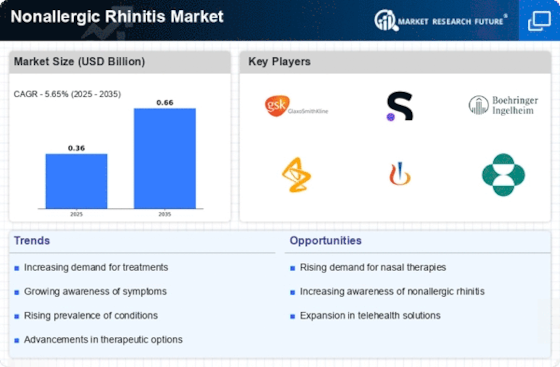Market Analysis
In-depth Analysis of Nonallergic Rhinitis Market Industry Landscape
The nonallergic rhinitis market elements rotate around understanding and tending to the workings of a pervasive nasal issue. Nonallergic rhinitis, portrayed by ongoing nasal side effects inconsequential to sensitivities, envelops different subtypes, and the market elements include factors impacting its finding, treatment, and by and large management. Market elements start with perceiving the broad predominance of nonallergic rhinitis, influencing people around the world. Be that as it may, diagnosing this condition presents difficulties because of its different causes, including irritants, medications, hormonal changes, and infectious agents. Worked on analytic devices and awareness are fundamental for exact recognizable proof and management. Nonallergic rhinitis appears in changed subtypes, like vasomotor rhinitis and gustatory rhinitis, each with one-of-a-kind triggers and side effects. The market elements include understanding the clinical heterogeneity of these subtypes and fitting treatment approaches in view of individual patient profiles. The effect of nonallergic rhinitis on the personal satisfaction is a huge driver in the market elements. Ongoing side effects, including nasal clog, rhinorrhea, and sniffling, can influence everyday exercises and rest. Perceiving and tending to these personal satisfaction concerns drive the demand for compelling medicines and management procedures. Market elements are molded by the scope of treatment modalities accessible for nonallergic rhinitis. These incorporate pharmacological choices like nasal corticosteroids, allergy medicines, and decongestants, as well as non-pharmacological mediations like nasal water system and way of life changes. The adequacy of these medicines impacts recommending examples and patient results. Nonallergic rhinitis frequently exists together with other ailments, like asthma, sinusitis, and headache. The market elements consolidate the acknowledgment of these comorbidities and the improvement of coordinated treatment moves toward that address the general wellbeing of people with nonallergic rhinitis. The acts of medical services suppliers, including allergists, otolaryngologists, and essential consideration doctors, altogether impact market elements. Understanding the most recent rules, indicative devices, and treatment choices is fundamental for medical services experts to furnish ideal consideration to patients with nonallergic rhinitis.


















Leave a Comment